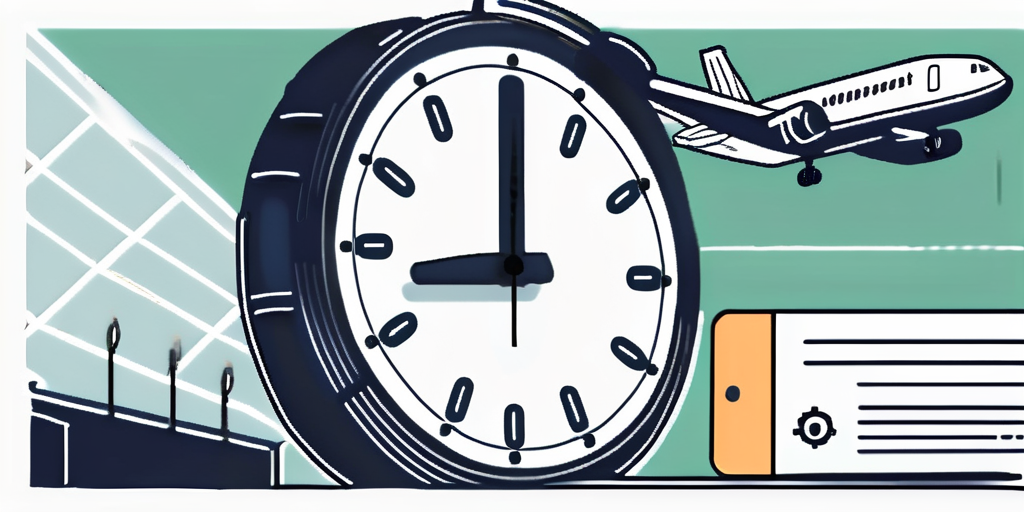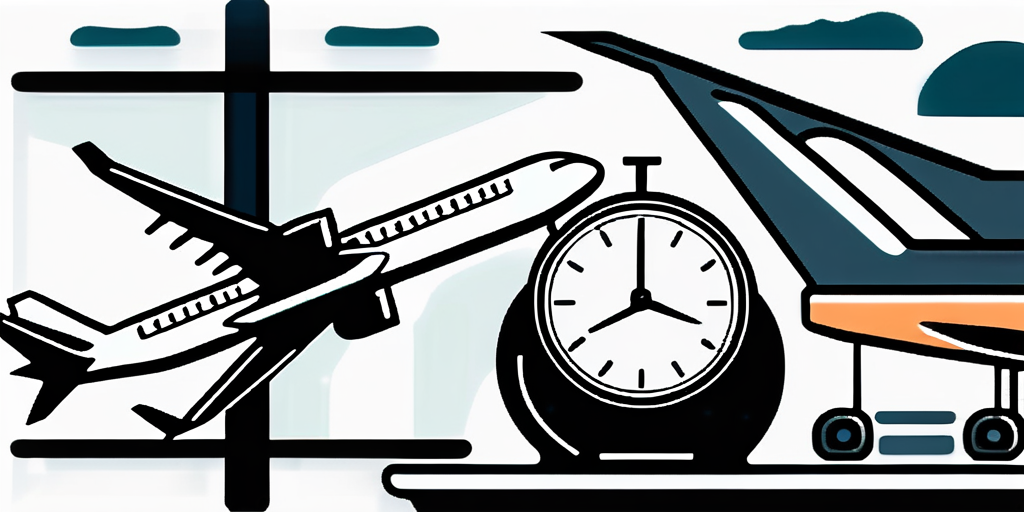Understanding Your Rights: 2 Hour Flight Delay Compensation
Discover what compensation you're entitled to for a 2-hour flight delay. Learn how to claim and understand passenger rights.
Flight delays can be frustrating and disruptive, especially when they cause significant delays to your travel plans. However, it's important to understand that you have rights as a passenger when it comes to flight delays of two hours or more. This article will explore the legal framework surrounding flight delay compensation and guide you through the process of claiming what you're entitled to.
The Legal Framework for Flight Delay Compensation
When it comes to flight delay compensation, the legal landscape can vary depending on your location. In Europe, the European Union Regulation EC 261/2004 plays a crucial role in protecting passenger rights. This regulation applies to all flights departing from an EU airport or those operated by an EU-registered airline. It sets out clear guidelines for compensation in case of flight delays, cancellations, or denied boarding.
In the United States, the laws addressing flight delays differ from those in Europe. While there is no specific federal legislation for flight delay compensation, the Department of Transportation (DOT) has implemented rules to protect passengers in certain situations. These rules mainly focus on compensation for involuntarily bumped passengers and require airlines to provide timely updates and assistance during lengthy delays.
Let's delve deeper into the legal framework for flight delay compensation in Europe. The EU Regulation 261/2004 not only provides guidelines for compensation but also outlines the rights of passengers in various scenarios. For instance, if your flight is delayed for more than two hours, you are entitled to assistance, such as meals, refreshments, and access to communication. If the delay exceeds five hours, you have the right to choose between a full refund or an alternative flight to your destination.
- Your flight needs to be delayed by at least 5 hours at departure to be eligible for a flight delay refund.
- Your flight must be delayed by at least 3 hours at arrival to be eligible for flight delay compensation.
- For a delay at departure of at least 2 hours, the airline must provide you with a meal (or meal voucher), refreshments, access to wi-fi, and 2 phone calls.
- For a significant delay at departure (5 hours or more), the airline must provide you with a hotel room and transportation between the hotel and the airport.
Furthermore, if your flight is canceled, the regulation states that you have the right to compensation ranging from €250 to €600, depending on the distance of the flight and the length of the delay.
With our free flight delay compensation calculator, learn whether you're eligible for compensation and how much the airline may owe you, in just 2 minutes.
It's important to note that these compensations are applicable even if the airline claims the delay or cancellation was due to extraordinary circumstances, such as severe weather conditions or air traffic control strikes.
Now, let's turn our attention to the legal framework for flight delay compensation in the United States. While there is no specific federal legislation, the Department of Transportation (DOT) has implemented rules to protect passengers in certain situations. One such rule is the requirement for airlines to provide compensation to involuntarily bumped passengers. If you are denied boarding due to overbooking, you may be eligible for compensation, which can range from 200% to 400% of the one-way fare, depending on the length of the delay caused by the airline.
In addition to compensation for involuntarily bumped passengers, the DOT rules also emphasize the importance of timely updates and assistance during lengthy delays. Airlines are required to provide passengers with regular updates regarding the status of their flight and any changes in departure time. Furthermore, if a delay exceeds a certain threshold (usually four hours), airlines must offer passengers the option to deplane and provide necessary amenities, such as meals and accommodations, if the delay occurs overnight.
Understanding the legal framework for flight delay compensation is essential for passengers to assert their rights and seek appropriate compensation when faced with flight disruptions. Whether you are traveling in Europe or the United States, knowing the regulations that protect you can help ensure a smoother journey and fair treatment in case of delays or cancellations.
Determining Eligibility for Flight Delay Compensation
Not all flight delays qualify for compensation. To determine your eligibility, several factors come into play. Firstly, the length of the delay is crucial. Generally, for flights covered by the EU Regulation 261/2004, you may be eligible for compensation if your flight is delayed by two hours or more. However, this threshold may vary in specific cases.
Exceptions to compensation eligibility may exist if the delay is due to extraordinary circumstances beyond the airline's control. These circumstances can include severe weather conditions, strikes, or air traffic control restrictions. In these cases, the airline may not be obligated to compensate passengers for the delay.

It is important to note that determining eligibility for flight delay compensation can be a complex process. Airlines may have different policies and interpretations of the regulations, which can lead to varying outcomes for passengers. Therefore, it is advisable to familiarize yourself with the specific regulations and guidelines applicable to your situation.
In addition to the length of the delay and exceptional circumstances, other factors may also be considered when determining eligibility. These factors can include the distance of the flight, the airline operating the flight, and the departure and arrival airports. Each of these elements can play a role in the final decision regarding compensation.
Furthermore, it is essential to keep documentation of the delay and any relevant information, such as boarding passes, receipts, and communication with the airline. This documentation can serve as evidence to support your claim for compensation. It is recommended to maintain a record of all interactions and correspondence with the airline, including dates, times, and names of the individuals involved.
Lastly, it is worth mentioning that the process of claiming compensation for a flight delay can sometimes be time-consuming and require persistence. Airlines may initially deny claims or offer lower amounts of compensation than what passengers are entitled to. In such cases, seeking legal advice or assistance from organizations specializing in flight delay compensation can be beneficial.
Calculating Your Flight Delay Compensation
If you meet the eligibility criteria for flight delay compensation, the amount you're entitled to will depend on various factors. These factors typically include the distance of your flight, the length of the delay, and the specific regulations governing your situation.
To understand the compensation calculation process, it's important to note that the EU Regulation EC 261/2004 provides a set compensation amount based on flight distance. For flights shorter than 1,500 kilometers, the compensation is €250. For flights between 1,500 and 3,500 kilometers, it rises to €400, and for flights longer than 3,500 kilometers, it reaches €600. However, these amounts may vary in certain circumstances.
With our free flight delay compensation calculator, learn whether you're eligible for compensation and how much the airline may owe you, in just 2 minutes.

Let's delve deeper into the factors that can affect your flight delay compensation. Firstly, the distance of your flight plays a significant role. It's not just about the actual distance between the departure and arrival airports, but also the "great circle" distance. This is the shortest path between two points on a globe, taking into account the curvature of the Earth. Airlines use this great circle distance to determine the compensation amount accurately.
Secondly, the length of the delay is another crucial factor. The compensation amount is typically based on the duration of the delay, which is measured from the scheduled arrival time to the actual arrival time at the final destination. The longer the delay, the higher the compensation you may be entitled to receive. However, it's important to note that certain circumstances, such as extraordinary circumstances or situations beyond the airline's control, may exempt them from providing compensation.
Lastly, the specific regulations governing your situation can also impact the compensation calculation. While the EU Regulation EC 261/2004 sets the baseline for compensation amounts, individual countries may have additional regulations or interpretations that can further influence the final compensation you receive. It's essential to familiarize yourself with both the EU regulations and any additional national regulations to understand your rights fully.
By considering these factors, you can gain a better understanding of how your flight delay compensation is calculated. Remember, it's always recommended to consult with legal professionals or specialized companies that can assist you in navigating the complex world of flight delay compensation and ensure that you receive the compensation you deserve.
Claiming Your Flight Delay Compensation
When it comes to claiming your flight delay compensation, following the proper steps is essential. Start by collecting all relevant documents, including your ticket, boarding pass, and any correspondence with the airline regarding the delay. This evidence will support your claim.
Next, contact the airline directly and submit a formal claim in writing. Be clear and concise in describing the details of the delay and your eligibility for compensation. Keep copies of all correspondence and receipts for any expenses incurred as a result of the delay.

Dealing with airline pushback is not uncommon, as some carriers may initially resist providing compensation. In these situations, it's crucial to remain persistent and assertive. If the airline denies your claim unlawfully, you can escalate the matter to the appropriate regulatory authorities or seek legal assistance.
Seeking Legal Assistance for Flight Delay Compensation
While claiming flight delay compensation can often be resolved directly with the airline, there are situations where seeking legal assistance becomes necessary. If the airline consistently refuses to provide compensation or if you believe your rights have been violated, it may be time to consider legal help.
In such cases, it's important to choose the right legal professional for your case. Look for an attorney or law firm with experience in aviation law or passenger rights. They will have the knowledge and expertise to navigate the legal complexities and advocate for your rights effectively.
Flight delays can cause significant inconvenience and frustration, but understanding your rights and the legal framework surrounding flight delay compensation can make a difference. By knowing when and how to claim compensation for flight delays, you can ensure that your travel experiences are more enjoyable and stress-free.
Ready to Claim Your Flight Delay Compensation?
If you've experienced a flight delay of two hours or more, ClaimCompass is here to help. We specialize in helping air passengers like you claim up to 600€ for flight disruptions. Our team handles the entire process, from submitting your claim to the airline to court proceedings if necessary. Don't worry about upfront costs; our services are risk-free, with no fees unless we secure your compensation. Check your eligibility for free using our compensation calculator and let us take the hassle out of claiming what you're owed. Submit a claim with ClaimCompass today and turn your travel frustrations into financial relief.
What if my flight is delayed by less than 2 hours?
Typically, if your flight is delayed by less than 2 hours, you may not be eligible for compensation under most regulations, including the EU Regulation 261/2004. This regulation generally specifies that compensation eligibility begins for delays exceeding 2 hours for flights of 1,500 kilometers or less. However, it's essential to review the specific terms and conditions of the airline and the regulations applicable to your flight, as they may vary. In some cases, airlines may offer amenities or assistance for shorter delays, even if compensation isn't mandated.
How long can a flight legally be delayed?
The maximum legal duration for flight delays varies depending on factors like airline policies and regulations. There isn't a universal timeframe applicable to all flights. Airlines aim to minimize delays, but unforeseen issues like weather or mechanical problems can cause them. Passengers should check with their airline and using our flight delay map tracker to be prepared. It's important to stay informed about flight status and updates provided by the airline during delays. While there isn't a set maximum legal delay, passengers' rights are typically outlined by airlines and regulatory agencies.
How do I make a claim for a delayed flight?
- Gather Information: Collect all relevant information about your flight, including the flight number, date and time of departure, and arrival, as well as any documentation related to the delay.
- Understand Your Rights: Familiarize yourself with the regulations governing flight delays in your departure and arrival locations. This could include EU Regulation 261/2004, US Department of Transportation rules, or other applicable regulations.
- Contact the Airline: Reach out to the airline directly to inquire about their compensation process for flight delays. Many airlines have specific procedures in place for handling compensation claims.
- Submit a Claim: Follow the airline's instructions for submitting a claim. This may involve filling out an online form, sending an email, or a letter using our Free Template for Flight Delay Compensation.
- Provide Documentation: Include any relevant documentation with your claim, such as boarding passes, receipts for expenses incurred due to the delay, and any correspondence with the airline.
- Follow Up: If you don't receive a response from the airline within a reasonable timeframe, follow up on your claim. Persistence may be necessary to ensure your claim is processed.
- Consider Alternative Options: If the airline denies your claim or you're unsatisfied with their response, you may explore alternative options such as contacting consumer protection agencies or seeking legal advice.
